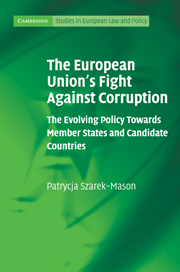 The European Union's Fight Against Corruption
The European Union's Fight Against Corruption Published online by Cambridge University Press: 03 May 2010
Commission (EC), ‘Communication from the Commission to the Council, the European Parliament and the European Economic and Social Committee on a Comprehensive EU Policy Against Corruption’, COM(2003) 317 final, 28.5.2003, Annex
To ensure credibility, a clear stance against corruption is essential from leaders and decision-makers. Bearing in mind that no universally applicable recipes exist, national anti-corruption strategies or programmes, covering both preventive and repressive measures, should be drawn up and implemented. These strategies should be subject to broad consultation at all levels.
Current and future EU Members shall fully align with the EU acquis and ratify and implement all main international anti-corruption instruments they are party to (UN, Council of Europe and OECD Conventions). Third countries should sign and ratify as well as implement relevant international anti-corruption instruments.
Anti-corruption laws are important, but more important is their implementation by competent and visible anti-corruption bodies (i.e. well trained and specialised services such as anti-corruption prosecutors). Targeted investigative techniques, statistics and indicators should be developed. The role of law enforcement bodies should be strengthened concerning not only corruption but also fraud, tax offences and money laundering.
Access to public office must be open to every citizen. Recruitment and promotion should be regulated by objective and merit-based criteria. Salaries and social rights must be adequate. Civil servants should be required to disclose their assets. Sensitive posts should be subject to rotation.
[…]
To save this book to your Kindle, first ensure no-reply@cambridge.org is added to your Approved Personal Document E-mail List under your Personal Document Settings on the Manage Your Content and Devices page of your Amazon account. Then enter the ‘name’ part of your Kindle email address below. Find out more about saving to your Kindle.
Note you can select to save to either the @free.kindle.com or @kindle.com variations. ‘@free.kindle.com’ emails are free but can only be saved to your device when it is connected to wi-fi. ‘@kindle.com’ emails can be delivered even when you are not connected to wi-fi, but note that service fees apply.
Find out more about the Kindle Personal Document Service.
To save content items to your account, please confirm that you agree to abide by our usage policies. If this is the first time you use this feature, you will be asked to authorise Cambridge Core to connect with your account. Find out more about saving content to Dropbox.
To save content items to your account, please confirm that you agree to abide by our usage policies. If this is the first time you use this feature, you will be asked to authorise Cambridge Core to connect with your account. Find out more about saving content to Google Drive.